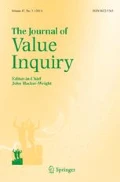Conclusion
MacIntyre, Clark, and Heidegger would all agree that the current problem with moral theory is its lack of a satisfactory conception of human telos. This lack leads us to resort to such fictions as rights, interests, and utility, which are “disguises for the will to power.”Footnote 1 These thinkers would also agree that modern nation-states are cut off from the roots of the Western tradition. Modern political economy, with “its individualism, its acquisitiveness and its elevation of the values of the market to a central social place”Footnote 2 is leading us into “the coming age of barbarism and darkness.”Footnote 3 MacIntyre's grim depiction of the future, which Heidegger calls “the time of the darkening of the earth” and “the flight of the gods”,Footnote 4 can only be met by re-appropriating our own tradition. Although Aristotle has much to tell us, I believe Heidegger is right to turn to Heraclitus for a non-anthropocentric conception of humanity's place in Nature. Other writers, however, such as Arne Naess, George Sessions, and Stuart Hampshire, argue that the writings of Spinoza may offer the most helpful vision of humanity needed to guide our efforts to find a more appropriate basis for our behavior toward each other and toward the non-human world as well.Footnote 5 Yet Aristotle, Qark, Heidegger, Heraclitus, Maclntyre, and Spinoza all agree that in order to behave fittingly, we must understand what it means to be human.
At this time, I would like to acknowledge the importance of the following objection to what I have been arguing here: While it may be true that the concept of human rights is a fiction, it is nevertheless a very useful fiction for changing how human beings relate to each other.Footnote 6 The doctrine of the rights of man justified the American and French revolutions, which brought forth new and important human freedoms. Today, most of humanity still lacks the protection afforded by constitutionally guaranteed human rights. Moreover, even in constitutional democracies there are frequent abuses of and attempts to curtail human rights. Until far more people become committed to protecting human rights, it is unlikely that there will be a big movement to extend rights to non-human beings, much less to overcome the anthropocentrism inherent in the concept of rights. What the Buddhist tradition calls “skillful means” is appropriate in our current situation.Footnote 7 We must approach people in a way sensitive to their current self-understanding. Before we can pass on to the stage of planetary unity made possible by non-anthropocentric thinking, we need to find ways that promote mutual respect among human beings.Footnote 8 Out of such respect there can also arise respect for the non-human as well.
While largely in agreement with this point of view, I would like to note that our means must be very skillful, indeed, if we are to transform our relationships to each other and to the natural world before irreparable damage is done to the earth, through nuclear war or environmental destruction. The time grows short for the transformation needed to bring us from the stage of anthropocentrism to a deeper awareness of our internal relationship to the whole world. Some people, such as Peter Russell, argue that we are witnessing the evolution of a non-anthropocentric mode of planetary consciousness that will be supported by the revolution in communications and computers.Footnote 9 Other people, such as Jeremy Rifkin, maintain that the coming computer age promises ever greater intrusions into natural processes, such as the drive for control of genetic structures.Footnote 10 In my view, while it is important to extend the idea of human rights wherever possible, it is also crucial that we consider seriously the possibility that the idea of human rights is merely a transitional way of conceiving of morality. As we learn more about the interrelationship of human life with all other aspects of the earth's life, our self-understanding will no longer be in harmony with the human-centered morality we know today. We will either learn to respect all beings and act toward them in appropriate ways, or else we will continue down the road we are now headed - a road which seems to have a very disturbing destination. Learning to dwell appropriately on earth is the most pressing moral issue of the day.
Similar content being viewed by others
Notes
Ibid., p. 240.
Ibid., p. 237.
Ibid., p. 244.
Heidegger, “What Are Poets For?” in Poetry, Language, Thought.
George Sessions, “Spinoza and Jeffets on Man in Nature,” Inquiry 20 (1977):481–528. Sessions' essay was criticized by Genevieve Lloyd in “Spinoza's Environmental Ethics,” Inquiry 23 (1980):293–311. In reply, Arne Naess wrote “Environmental Ethics and Spinoza's Ethics: Comments on Genevieve Lloyd's Article,” Inquiry 23 (1980):313~ 325. Cf. also Stuart Hampshire, Two Theories of Morality (Oxford: Oxford University Press, 1977).
Tom Regan has frequently pointed out that even if the concept of rights proves to be ficticious, it can be helpful in protecting non-human beings from abuse by humans. Cf. his essay “Exploring the Idea of Animal Rights,” Animals' Rights - A Symposium (Sussex and London: Centaur Press Ltd., 1979); Regan, “Animal Rights, Human Wrongs,” Environmental Ethics 2 (1980):99–120.
My thanks to Professor David Levin of Northwestern University for having reminded me of the importance of approaching the question of human rights in a “skillful” way.
On the topic of the relation between spiritual-psychological growth and the shift in human morality, cf. M.W. Fox, “Animal Rights and Nature Liberation,” in Animals' Rights - A Symposium.
Peter Russel, The Global Brain: Speculations on the Evolutionary Leap tp Planetary Consciousness (New York: J.P. Tarcher, 1983).
Jeremy Rifkin, Algeny (New York: Viking, 1983).
Author information
Authors and Affiliations
Rights and permissions
About this article
Cite this article
Zimmerman, M.E. The critique of natural rights and the search for a non-anthropocentric basis for moral behavior. J Value Inquiry 19, 43–53 (1985). https://doi.org/10.1007/BF00151415
Issue Date:
DOI: https://doi.org/10.1007/BF00151415




